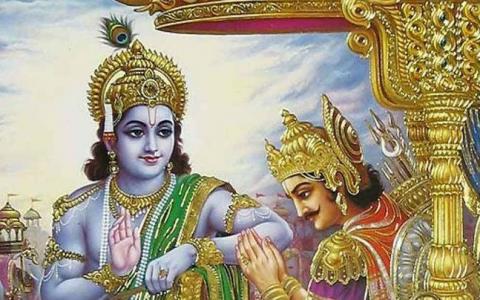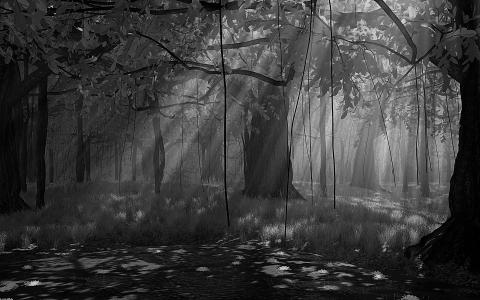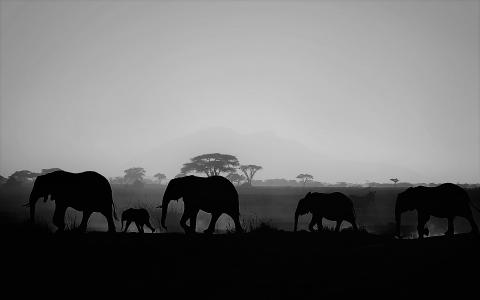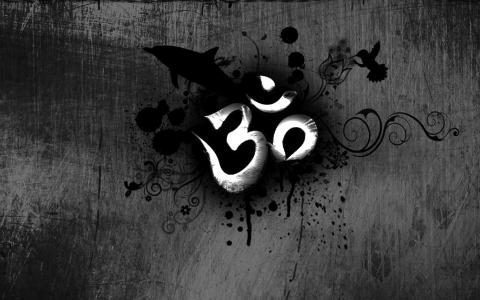
Introduction
āvudò viśvarahasyaṃ
jīvāṃgaṇakiḻidu janada sukhaduḥkheccā-|
dyāveśadi sahabhāgivò-
lāvirbhavisidudu kṛṣṇananènipa vicitram ||
This strange thing called Kṛṣṇa
a cosmic conundrum,
having entered the jīva’s playground,
Has manifested itself
As a partner to people
In their pleasures, sorrows and desires.
narano naradaurbalyava
pariharisalbaṃda viśvadaṃtassattvaṃ |
dharisida rūpo kṛṣṇaṃ
paramādbhutamenò namage satyaṃ śaraṇaṃ...

Arjuna’s mind is gaining maturity. Didn’t Bhagavān say –
dadāmi buddhi-yogam...
BG 10.10
What is buddhi-yoga? Buddhi is a faculty of the antaḥkaraṇa. Manas (mind), saṅkalpa (will), jñāpaka (recall) and other mental faculties hanker after so many external objects, collecting sensory information about them. The buddhi (intellect) gathers all these pieces of information under its purview, analyses them, classifies them, assesses their...

Note
nija-mahimeyan-īśaṃ tā-
n-ajan-avyayan-aprameya-navaviliptaṃ meṇ ।
tri-jagad-vyāptaṃ śaktaṃ
bhajanīyaṃ kāmyaneṃbudaṃ baṇṇisuvam ॥
Īśvara, the birthless, imperishable,
immeasurable, unattached,
pervader of all the three worlds, and powerful,
describes his own glory and
shows how he can be praised and loved.
Summary
Our freedom to discern must be used to gain the knowledge of Bhagavān’s nature, his non-attachment and omnipotence....

Those who follow the āsurī form of prakṛti delude and waste themselves.
moghāśā moghakarmāṇo moghajñānā vicetasaḥ
BG9.12
The rākṣasas are cruel and unscrupulous. For them, their bodies are their self and bodily pleasures are the greatest happiness. Naraka and repeated births in lowly creatures are their fate.
Bhagavān expounds upon this dual nature of prakṛti later in the sixteenth chapter.
How can man be liberated if he is being pulled...

7. "Mamātmā bhūtabhāvanaḥ" : Brahma-consciousness is the cause of a jīva's rise and fall. The term bhāvanaḥ can variously mean birth, existence, sustenance, or control. Brahma has embedded the seed of Ṛta (Cosmic order) and dharma in human nature. Ṛta is the law in creation. "Deeds beget appropriate rewards and a jīva has to experience them" is the cosmic law of ṛta. The practical application of ṛta in life is dharma. Dharma and adharma result...

4. Now on to "na matsthāni bhūtāni". Was it not said earlier that matsthāni bhūtāni (all objects are in me)? But when we analyse reality, the objects do not exist in me; but only appear to be in me. Brahma is the substratum for that appearance. A traveller sees flowing water at a distance. But it is nothing other than a mirage. It is only a phenomenon; not an actual stream. That false appearance is created by a combination of sand, sunlight, and...

The two ślokas beginning with “Mayā tatamidaṁ” have the following seven points.
Mayā tatam-idam (All of this is pervaded or extended by me)
Mat-sthāni sarva-bhūtāni (All beings exist in me)
Na cāhaṁ teṣv-avasthitaḥ (I am not in them)
Na ca mat-sthāni bhūtāni (The beings are not in me)
Bhūta-bhṛt (The sustainer of beings)
Na ca bhūta-sthaḥ (Not in these beings)
Mamātmā bhūta-bhāvanaḥ (My Self constitutes the existence of beings)
There...

Note
sarvagatamirdum ātmaṃ
nirvikṛtaṃ sarvaśaktam adu niṣkarmam ।
nirvairaṃ sarvasamaṃ
nirvṛtidaṃ patrasumajalārpakariṃgam ॥
The ātmā, though all-pervading,
is immutable, and though omnipotent, is actionless.
It is without a rival, and is the same everywhere.
It yields supreme bliss to even those offering a leaf, a flower or water.
Summary
The objects of the world function because of Brahma. Because of this, we confuse those objects for...

The Importance of Feeling
During dhyāna, it is not syllables that are important, neither are sound or meaning. Feeling is paramount. The syllable is a means to bring the right feeling to the mind. Mūrtis and pictures of deities, worship with incense sticks and lamps are also the means to bring to mind the emotion associated with the divine. Therefore, the mind should be made to focus on the meaning of the syllable — the feeling associated with...

Note
Brahmavadeṃ jīvavadeṃ ।
Karmavadeṃ bhautadaivayajñaṃgaḻadeṃ ॥
Gamyavadeṃ dhyeyamadeṃ ।
Samyagbodhanéyanintu pārthaṃ beḍal ॥
What is Brahma? What is the jīva?
What is karma? What are the bhauta, daiva and yajñas?
What should the destination be? What should the goal be?
Asked thus Pārtha, for guidance full.
uttaravanéṃṭu keḻkéga-
mittu baḻikkéṃtu jīvamīśa-smṛtiyoḻ ।
cittaikāgrābhyāsadi-
nuttama-gati-gervudéṃdu hari bittaripaṃ ॥...
